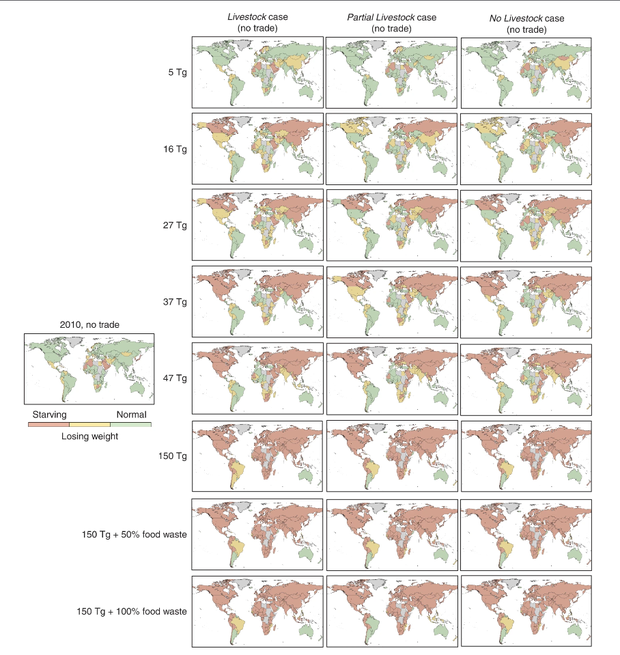The consequences of a nuclear war would be immediately devastating to those within the direct path of a nuclear weapon. . But new research shows just how deadly the scope of such warfare can be. A nuclear explosion would cause a global famine because soot blocks sunlight, disrupts the climate system, and limits food production.
Even a relatively minor nuclear conflict, such as that between India and Pakistan, would It would be devastating, researchers found. A week-long nuclear war involving about 100 weapons and the release of 5 Tg and about 11 billion pounds of soot would directly kill 27 million people. The study found that after two years, if international trade stopped and temperatures dropped by 34.7°F, the rest of the population would still be eating the minimum amount of food necessary to survive, about 1,999 calories per person. Hypothetically, the famine it causes will kill 255 million people. per day.
A week-long war involving 4,400 weapons and 150 Tg, or 330.6 billion pounds of soot, the largest scenario considered - between the United States, its allies, and Russia Stuff and more - 360 million people died directly and more than 5 billion died from hunger, the study says. Soot density lowers global temperatures by more than 58 degrees Fahrenheit.
"The injection of soot into the stratosphere from the use of fewer nuclear weapons would have a smaller global impact," the researchers said in their paper. Limit escalations.
Using climate, crop and fisheries models, researchers found that the climate impact of nuclear war soot peaked in the first few years and continued for about a decade thereafter. I discovered that
In a worst-case scenario, studies found that global average calorie production from crops would be reduced by about 90% just three to four years after a nuclear war if 150 Tg of soot were released. rice field.
"This shift will cause catastrophic disruption to global food markets," the study said. In 1961 the Food and Agriculture Organization (FAO) observation records began.
Rutgers University climate scientist and lead author Lili Xia told Nature that the situation would be "really bad."
"Most people will starve," they said.

The findings are the result of examining different scenarios. Scientists have considered whether people will continue to raise animals or use leftover crops to feed people instead. It also envisioned that food waste would be limited, and that the global food trade would come to a halt as countries sought to conserve their own food.
However, research Not all countries in the world will face the same fate under any given scenario. Under the smallest nuclear war situation investigated, the researchers found that the Middle East, parts of Central America, and parts of Asia saw food shortages to the point of starvation, while most of the rest of the world
In the most extreme situations investigated, Australia, Argentina, Uruguay, Oman, Brazil, Paraguay, and a few other countries found All countries will go hungry except
"When I first showed my son the map, his first reaction was 'Let's move to Australia,'" said her Ms. Xia.
Earlier this year, a survey conducted by CBS News found that70% of adults believed that a Russian invasion of Ukraine would lead to nuclear war. These findings come after Russia's foreign minister said the risk of a nuclear conflict "should not be underestimated". became
. In July, Iran said it had the technical ability to manufacturenuclear weaponsbut said it had not yet done so, and North Korea's leader } Kim Jong Un said he would use nuclear weapons in a potential military conflict with the United States and South Korea.
Nuclear weapons have not been used in conflict since 1945, but now the United States and Russia have over 1,500 of her nuclear weapons deployed and ready to launch.
Alex Wellerstein, a historian and professor at the Stevens Institute of Technology, said that engaging in such actions would be a threat to America's enemies.
But he said it was still a concern. He said. "I guarantee."
He of CBS Morning contributed this article by Tony Dokoupil.
- In:
- War
- Nuclear Weapons
- Russia
- Nuclear Attack

Li Cohen is a social media producer and trending reporter for CBS News, focusing on social justice issues.
Thank you for visiting CBS NEWS.
Create a free account or log in to
for more features.


